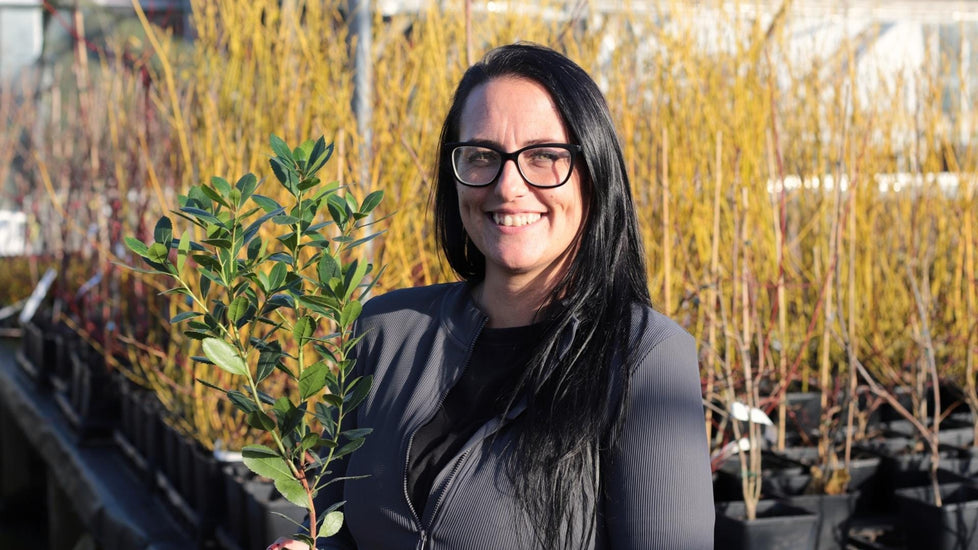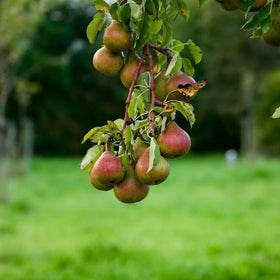Perfectly happy plants, or your money back
Specialist overnight plant delivery
The highlights
- Expertly grown in a columnar shape
- Includes RHS award-winning varieties
- Bake in crumbles, pies and tarts
- Succulent pears, delightful blossoms
Description
- With their vertical, narrow shape, cordon fruit trees offer an inventive means of saving on space whilst still producing impressive fruit yields – where with a standard fruit tree you might only have room for one in your garden, you could most likely fit several cordons!
- ‘Concorde’ holds the Royal Horticultural Society’s Award of Garden Merit, boasts pears with truly exceptional taste and reliably produces large crops of fruit every year
- 'Doyenné Du Comice' proudly flies the flag for French pears, with its bold, aromatic flavour and wonderfully soft flesh. Use them to make a rich tarte tatin or, alternatively, poach them in spiced red wine - and yep, you guessed it, it's another RHS Award of Garden Merit (AGM) winner!
- ‘Williams' Bon Chrétien’ is a variety with incredible pedigree, having been grown for well over two hundred years. The fruit is juicy, sweet and delicious when poached or baked
- Our growers have established the proper cordon shape for your pear tree, meaning all you need to do is prune your tree to help retain its shape. Pruning should be carried out in summer with occasional winter pruning also occasionally being required. Here’s what to do:
- Towards the end of August, trim shoots that are over 20 centimetres (or 8 inches) long, cutting back to one leaf beyond the cluster of leaves at the base of the current year’s growth (the basal cluster)
- If you find that your cordon tree’s spurs are becoming overly crowded, then thin out some of the older spurs which haven’t fruited as well (this is best done in winter)
What To Expect
Supplied as:
Height on arrival:
Eventual height:
Eventual spread:
Time to first crop:
Flower colour:
Habit:
Hardiness:
Self fertile:
Pollination group:
Uses:
Rootstock:
Spacing:
How To Grow

Good pest and disease resistance
Pear trees are generally pretty healthy, though they can be impacted by aphids, caterpillars and (occasionally) diseases like pear scab and leaf spot.

Full sun
Your pear tree will produce the most fruit when grown in a fully sunny position (at least 6 hours of direct sunlight per day).

Any fertile, well-drained soil
Pear trees grow best in fertile soil with good drainage.
Planting Calendar
- Best time to plant
- Harvest
- Flower
South Downs National Park
Meet Danielle
110 years' expertise free with every tree
Danielle's nursery has been growing trees in the South Downs National Park for over a century, and it shows. Dug up and sent straight to your garden at between 18-36 months old, their quality rootstocks, expert pruning and natural pest control mean that these traditionally field-grown trees are the hardiest you can get.
What customers say about us
We do our best to provide you the best experience ever
Growing with Roots
Good to know
Our plants are grown in the UK
Specialist UK growers we know and trust grow your plants the traditional way, with organic fertiliser and biological pest control. They pick only the healthiest plants for you, professionally pruning them so that they’ll grow strong and well shaped.
Our plants are delivered overnight
Your plants are sent to you fresh from the field in our plastic free box that’s specially designed to hold them tight, then securely delivered by specialist plant couriers - straight from the grower to your garden within 24 hours.
We're here to help at every step
We want your plants to have a long and healthy life. Expect easy-to-follow grow guides and videos devised by our team of experts.
Perfect plants, guaranteed
We’re confident that you’ll be delighted with your new plants. Need help? Alice and her team are here to guarantee you’re perfectly happy.
Learn from our experts

Cordon Apple Trees: A Complete Guide
Digging deep to answer your questions
How do I know I'm getting quality plants?
All of our plants are grown in specialist nurseries with the highest standards of plant care and sustainability. We guarantee you'll love them as much as we do! Don't just take our word for it - we've got thousands of great reviews on Trustpilot.
When will I get my plants?
The delivery timescale for each plant is on the web page (near the 'add to basket's button). You'll receive a dispatch email with an exact delivery date once your plants are on their way, so you can get the garden ready.
How will my plants be packed and delivered?
We send all of our orders through a courier network designed to handle plants. Specialist equipment ensures that no plants will be damaged during the packing process and every order is carefully finished and checked by plant-loving humans. Your plants will arrive in the most sustainable packaging possible with minimal to no plastic used.
Where do you deliver?
We deliver to anywhere in Mainland UK for our standard delivery cost. We are able to deliver most plants to Highlands and non UK mainland however this will be at an additional cost. This will be calculated at the checkout. Please note, deliveries to these locations will take longer. Unfortunately, we are not able to deliver to Northern Ireland at present.
Ask the grower
One of our trusted team will get back to you via email
What customers say about us
We do our best to provide you the best experience ever
Best plants you will ever get online
I have ordered plants from them twice this year. They arrived well packaged, on time and looked strong and healthy. I feel the staff from Roots plants deal with their plants and customers with passion and care. I can’t wait to order again, price is good as well.
Peter Mawer
Highly recommended all round
Delivered quickly, perfectly packaged and the tree was in excellent condition. Really healthy and taken to the garden with no problems. Can't recommend highly enough. 5 stars isn't enough!
John Harris
Satisfied customer
Unlike other online sellers, this company are well ahead in the quality stakes. My plant arrived promptly as per their promise and the plant was much more established and healthy than I had expected. It’s the second time I have ordered from them and I have faith in their promise. Excellent service.
Karen McEwan
A really good quality tree
A really good quality tree, delivered on time and very well packaged. But the emailed planting advice and supporting information was what really impressed me. Thoroughly recommended.
Martin C Simmons
Exceptional quality
The quality of the plants was exceptional, unlike ones I have had before from local garden centres. Thank you so much. I will definitely be using you again.
Sara Bradley
Marvelous!
Marvelous service, great plants and fast delivery. Very useful information on how to care for the plants I bought. Easy to use website that makes it far too easy to overindulge in fabulous plants😂🌱
Cheryl Mae Owen


















